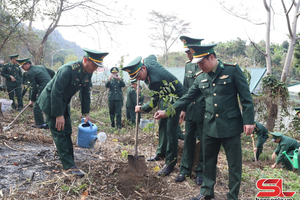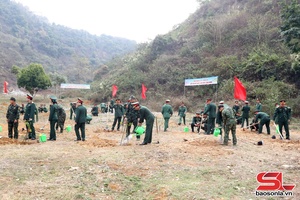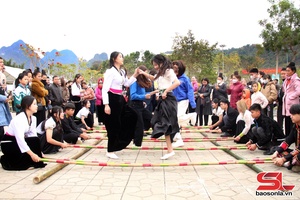The board for farmers' affairs under the provincial Vietnam Fatherland Front Committee has focused on implementing support policies to create favourable conditions for these cooperatives to operate efficiently, generate jobs, and provide stable income for many labourers, thus helping farmers improve their livelihoods and get rich.
.jpg)
Visitors check in at Nang Tien Waterfall tourist site, which is managed and operated by Chieng Khoa Agricultural Tourism – Service Cooperative in To Mua commune.
Bac Cam Khuyen, Permanent Vice President of the provincial Farmers’ Union and head of the provincial board for farmers' affairs, said that every year, the board coordinates with relevant departments to promote and encourage the establishment of cooperatives and attract the engagement of farmers.
At the same time, cooperatives are guided to develop in accordance with value chains, apply high technology, adopt clean and organic production practices, and improve competitiveness, thus creating stable jobs and income for members and local farmers.
In addition, it has coordinated with relevant specialised agencies to hold training courses for key members of farmer-owned cooperatives on organisation and operational methods; provide guidance on brand building, crop care, and product preservation, packaging, and transportation.
At the same time, efforts have been made to promote trade, expand markets, and launch the “Excellent Production and Business” emulation movement, replicate exemplary models such as “Outstanding Vietnamese Farmers” and “Farmers’ Scientists,” while encouraging members to start a business, boost innovation, and promote economic development.
In their operations, these cooperatives have contributed to household economy development and supported local authorities in guiding farmers to apply science and technology, diversify production sectors, and strengthen production-business linkages. Many of them have invested in regional linkages, value chain production, and the application of VietGAP, GlobalGAP, clean, and organic production processes.
Their products have good labelling and packaging, and clear traceability, and geographical indications; many have been rated as three-star OCOP (One Commune One Product) items or higher. The average annual profit reaches 150-200 million VND (5,720-7,620 USD) per cooperative, with members earning an average monthly income of 4-4.5 million VND per person.
Nguyen Van Tien, Director of Tien Thanh Agricultural Service Cooperative in Chieng Son commune, shared that the cooperative cultivates over 60 hectares of oranges, pomelos, tangerines, and longans, with an annual output of at least 800 tonnes. It has received support from various levels of the farmers’ union in combining fruit tree cultivation with forest-based economic activities to maximise advantages and income for its members.
At the Binh Thuan Production, Business, and Service Cooperative in Binh Thuan commune, thanks to the assistance of the Farmers’ Union to learn from the experience of several successful cooperatives in the province, the cooperative has focused on improving production and business efficiency in line with local conditions.
Nguyen Thi Binh, Deputy Director of the cooperative, said that it has linked with about 400 households to purchase fresh tea buds, processing 400-500 tonnes of tea products annually for export to the Taiwanese market through companies in Hanoi. The cooperative’s Trong Nguyen tea product was recognised as a 4-star OCOP product in 2019 and re-evaluated in 2023, contributing to raising income and sustainably reducing poverty for local residents.
To further support farmer-owned cooperatives, the provincial board for farmers' affairs continues to work with specialised agencies to organise training and capacity-building programmes for cooperative members, combined with study tours inside and outside the province. More policy dialogue forums will be held to understand needs, address challenges, and promote the effective operation of cooperatives, while additional efforts will be made to promote trade and expand product markets.
The board will encourage farmers to join together in forming cooperatives, and tapping into local potential to develop production and create jobs, thereby contributing to the local socio-economic development.























You have 500/500 characters left
Please enter 5 or more characters!!!